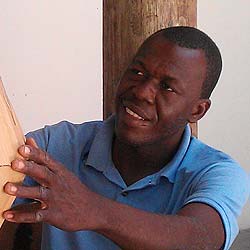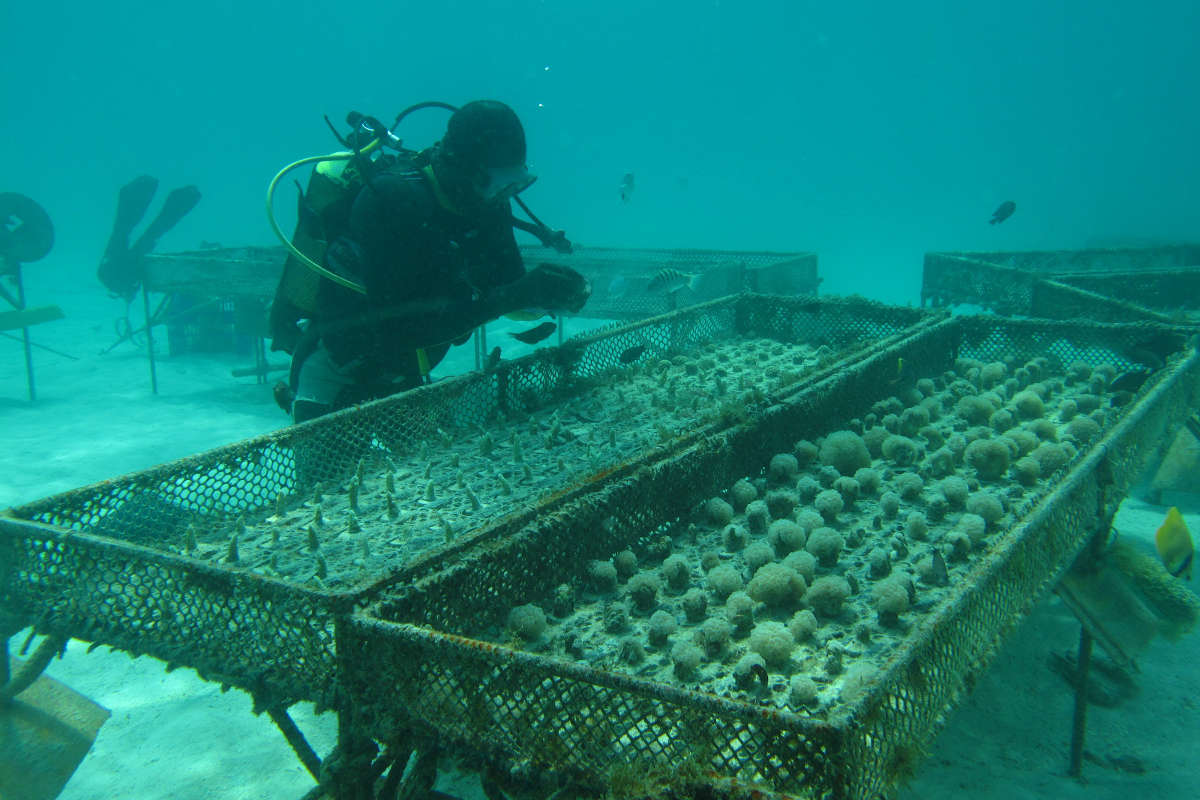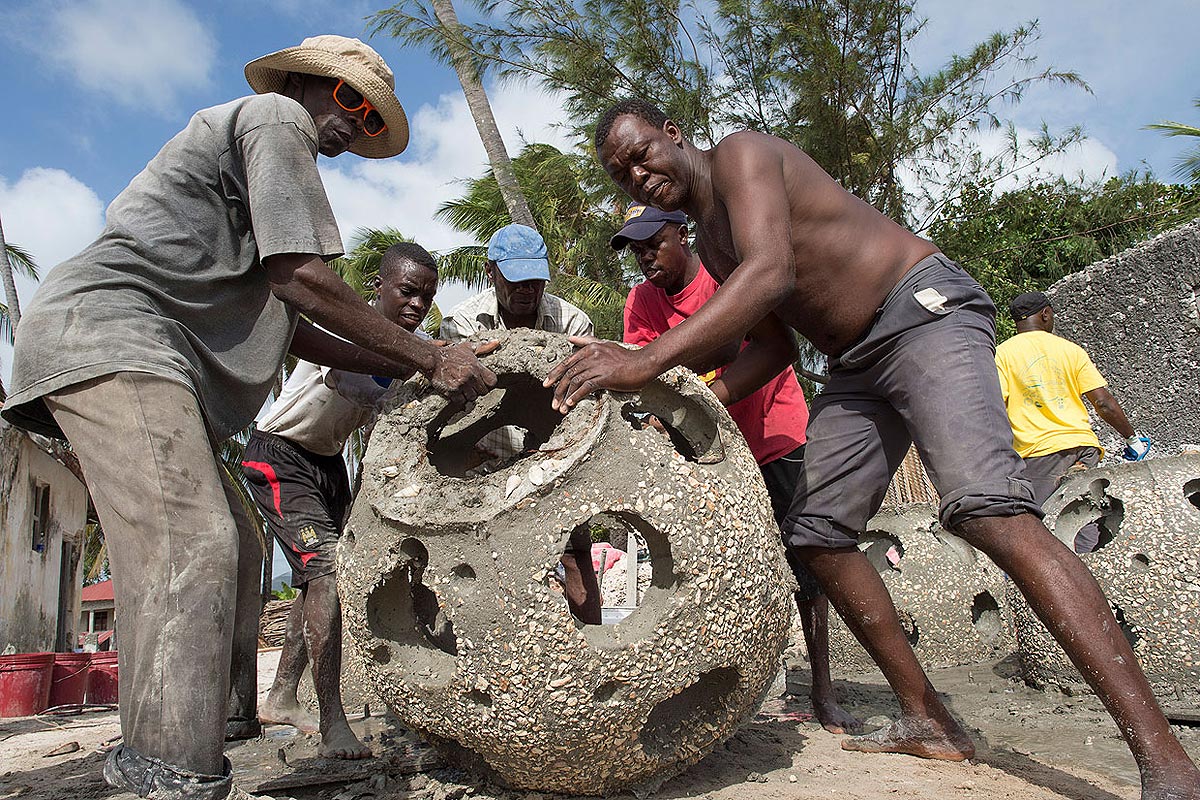“The lagoon used to be rich with life”
Okala, coral farmer and project manager with marinecultures.org, tells about the changes at the Zanzibar coast and about his work with the coral and the sponge farms.
“When I was around 10 years old, I started to play in the sea, down on the beach. My father was fisherman, so was his father before him. He just took me out to the reef where he used to catch octopus, collected sea cucumbers and other kinds of sea animals. So, this is how I learned from him to fish or to catch. But things have changed. The marine life we had before is totally different now.
Look at the situation of the lagoon. Before, life was good because they caught enough. Now there are less and less fish in the lagoon. The traps are often empty. That’s why I am working in this project now.
Fishermen have to go farther outside of the lagoon. Outside the reef, it’s a little bit easier to find fish. Sometimes they even catch huge fish like Gupa and others. As you can see, today the sea is calm and you can go out. On other days, the Indian Ocean out there can be very rough. No one can go out on the water. Even in this season, their small boats sometimes struggle outside the reef.
The Dema fish trap, a typical Zanzibar trap built with palm leaves and wood, is one of the important pieces of fishing gear. If the catch is good, he gets enough income and can even sometimes try for octopus or other species. As a trap fisher he is depending on his Dema.
The environmental situation here has changed. There is less and less octopus, fish, shellfish, corals and other important species. A lot of plant life and sea animals are already dead; others are suffering because of high temperatures and climate change. It seems like the only thing we can do is wait as they die. Many parts of the lagoon that used to be rich with life, like the deeper lagoon channel, have problems nowadays. Not that long ago, it was a very healthy habitat for fish, but once the corals were gone, nothing lives there anymore.
These environmental changes are an on-going problem for us in Zanzibar. Over time, the corals are being bleached; they are dying and the fish are disappearing. Additionally, overfishing of the ocean creates an imbalance in the marine ecosystem. The loss of biodiversity damages the food chain; it has a catastrophic impact on coastal economies. When sea life is poor, the people who depend on it are impoverished as well.
I hope we realize soon all the effects of climate change are a result of human activities. That’s why we should change our behaviour in order to protect the environment.
Another challenge of the coastal area is the waste on the beaches and in the water. Local people, and even hotels, dump trash there. Every morning, you can find rubbish on the beach, and this affects the marine animals. And it affects the people who use the sea for seaweed farming or collecting food.
Our beaches are also littered with plastic that has travelled here from places far away. Globally, there are more than 9 billion tons of plastics circulating and only a small part of the material gets recycled. Nobody knows how much of plastic waste ends up in the oceans where it’s estimated to last for hundreds of years. Plastic material affects nearly 700 marine species and kills millions of animals every year when they ingest or get tangled in it.
Now we are trying to reforest the coral reefs, which is a big task. Last year, some of our young corals were affected by high water temperatures. We had planned to sell farmed corals internationally for use in aquariums, but we had to give up because of the climate change and too high water temperatures. Now, we are focused on reforestation. We help the reefs to recover. We replace the corals in areas, which have been destroyed by climate change and unsustainable fishing practices.
In our coral farm, we cultivate soft and hard corals using different techniques. We pin the soft corals onto thin sticks. We glue the hard corals directly on small discs. Another important task is cleaning the coral tables, using tools or just our hands to remove all the build-up of excrement or seaweed, which can limit growth over time.
Another task I have is to teach the sponge farmers. We train new farmers to cultivate sea sponges in a truly sustainable way. I teach them how to farm sea sponges without harming the environment or affecting the natural species in a negative way. My goal is also to help these women by giving them a skill, which they can use to create a better future for themselves and their families.
I am here to bring awareness to my community, and to my family. The available resources are not all for us, we are responsible for our future generations. We have to make sure that we are going to give our children enough resources. We have to let them know that they are not the owners and that we all together are responsible for the environment until the end of the world.”
The story of Okala comes from the documentary "Bahari Salama".
Additional Information



